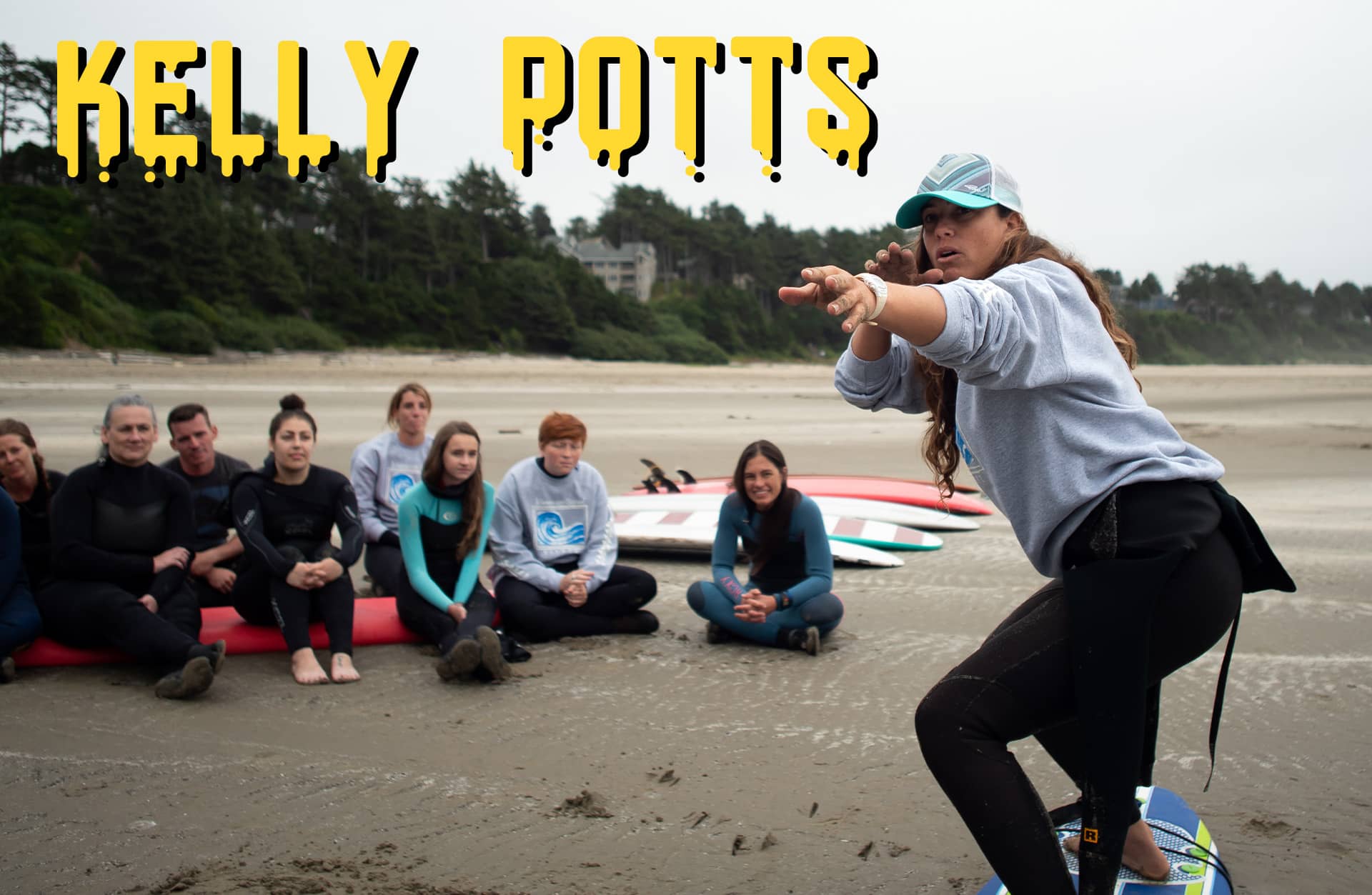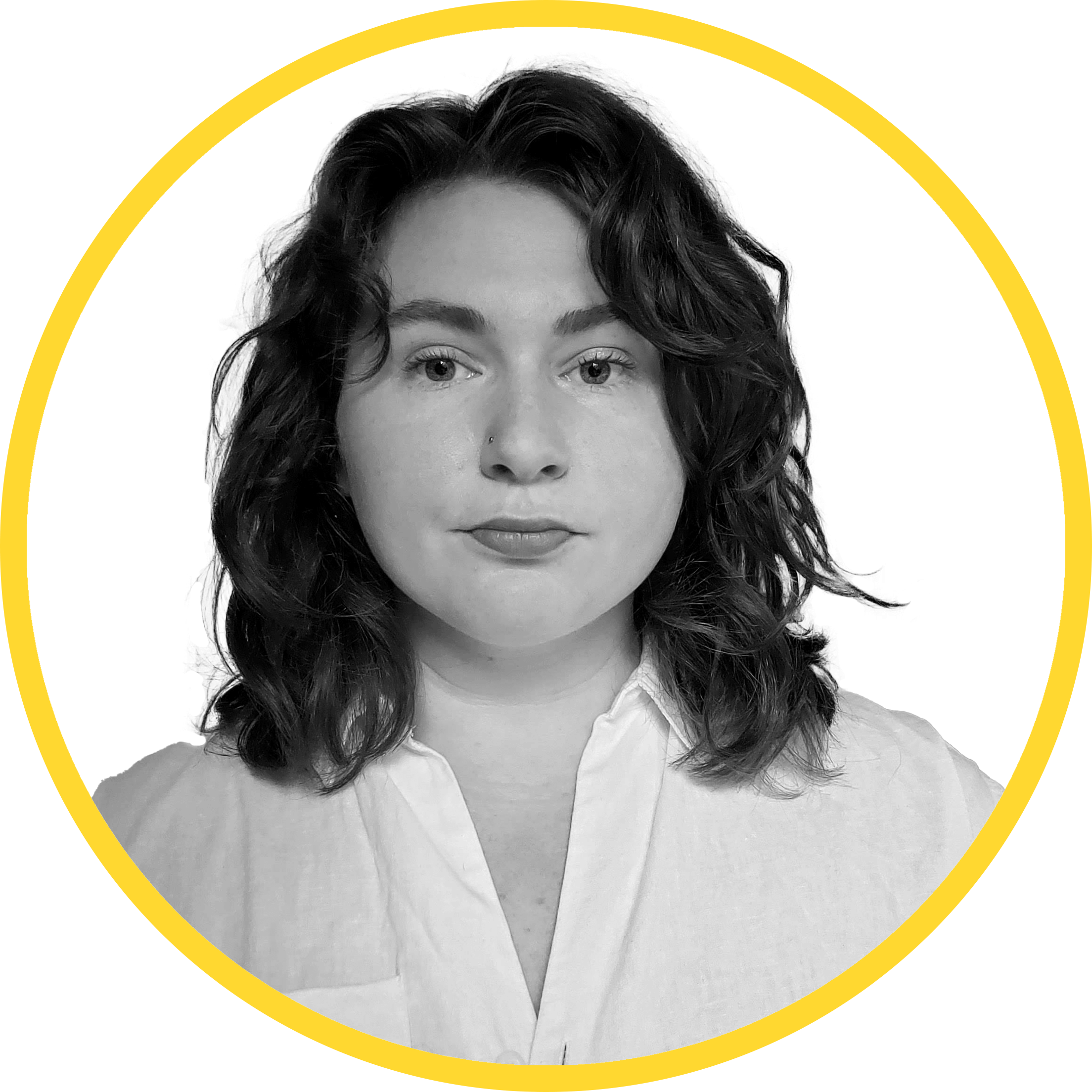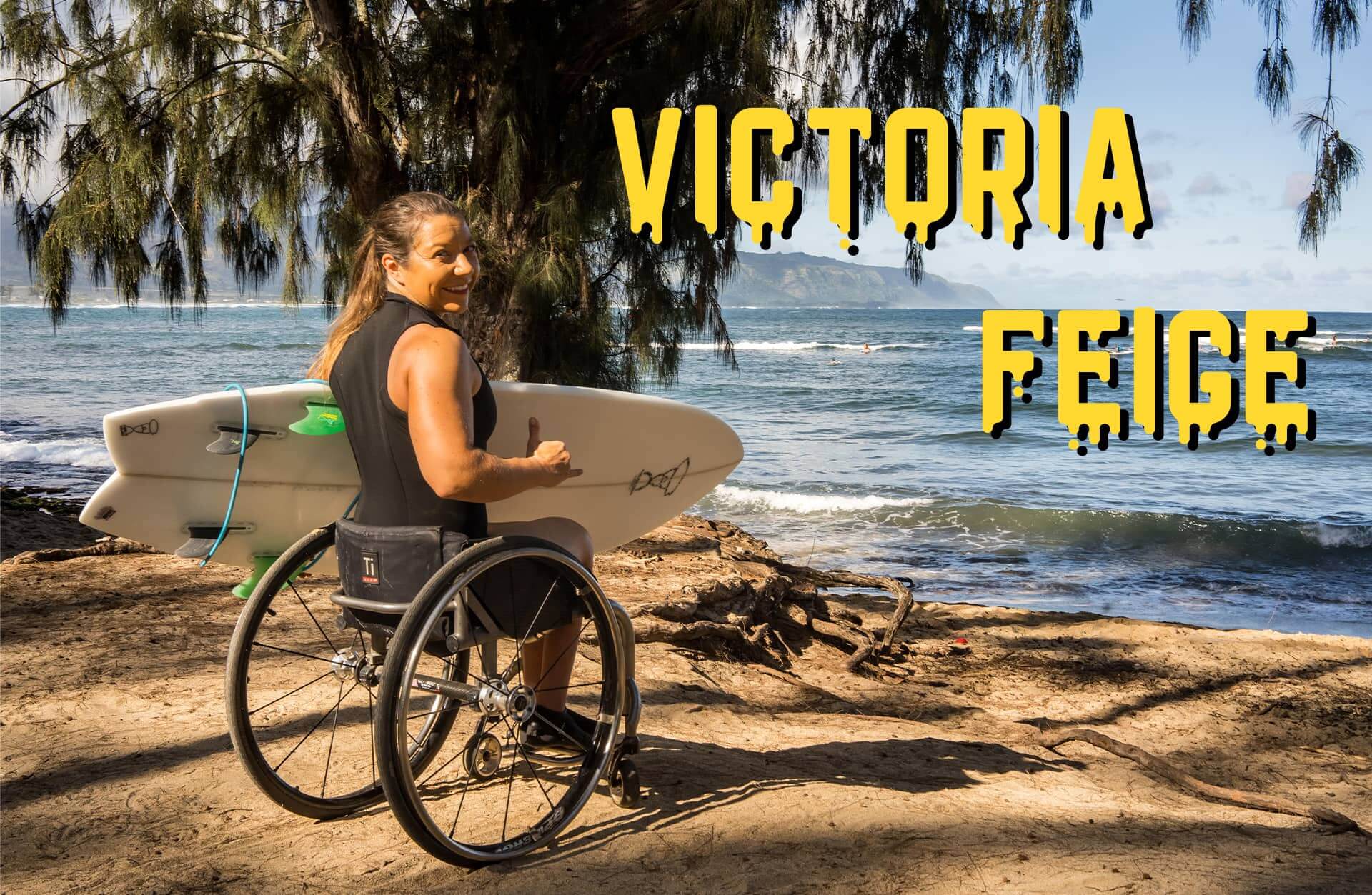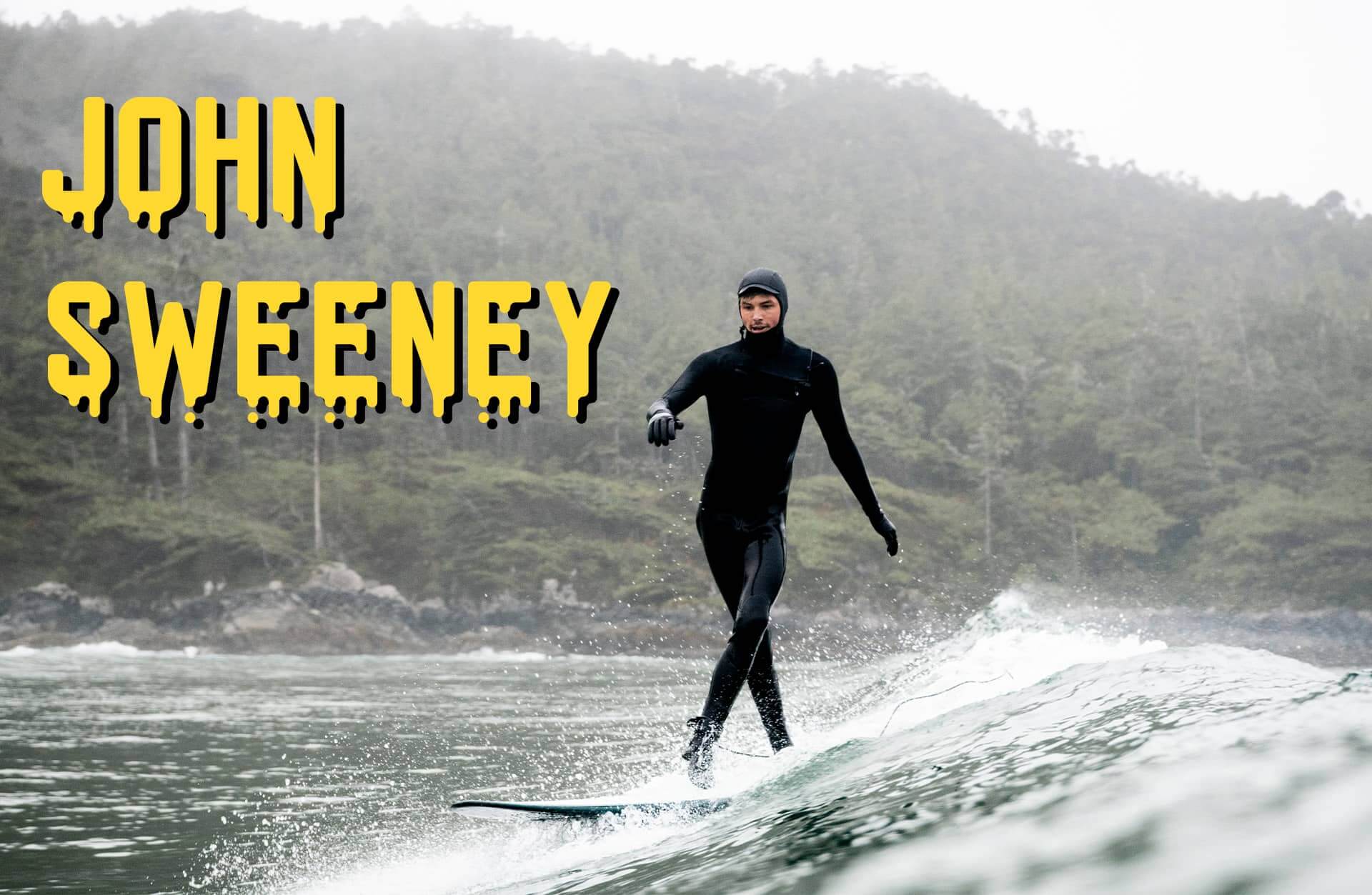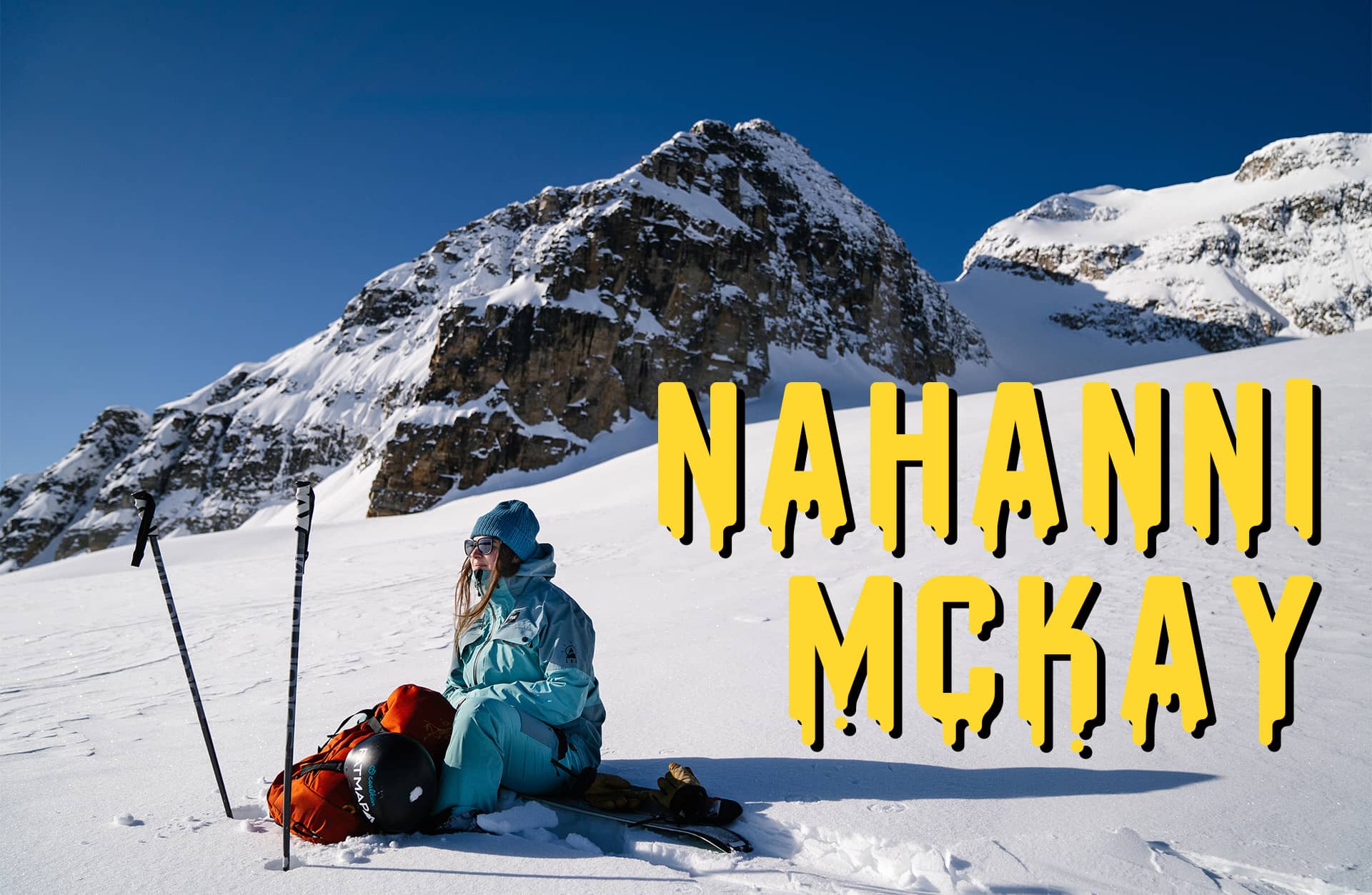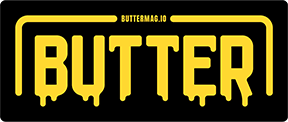SURF // 01 SEP 2023
ALL ARE WE WATER COLLECTIVE
“The relationship that I’ve built with the ocean, it’s been an evolving relationship through time. I feel like [the ocean is] my emotional absorber whenever things are happening in life,” said pro surfer and founder of All Are We Water Collective Kelly Potts. “Whatever it may be, [the ocean] absorbs that for me. Whether it’s something really good or something really bad. I think that’s what I’ve come to find is what keeps me attracted to [both the ocean and surfing].”
Living in Austin, Texas, several hours away from the ocean, surfing wasn’t on young Potts’ radar. That is until she visited her father on Maui. A lifelong surfer, Potts’ father had her on a board as soon as her plane landed. “He picked me up right off the airplane and we went straight to the water,” recalled Potts. “The first time I got out on the water he was like, ‘oh, we’re just going to learn how to paddle today kiddo.’ Then the second day was learning how to get into waves and how to ride them, maybe standing up, maybe not. And then the third day was when I was actually standing up.”
“My office now is actually at the same place that my dad took me straight to, right off the plane,” she smiled.
At fifteen Potts decided to move to Maui to live with her father, shortening her ocean commute from a few hours by car to a short stroll. “He lived right across the street from the surf breaks in Lāhainā,” recalled Potts. “So, I was always trying to go surfing before I went to school and after school.”
Unable to kick the competitive drive established in her years of team sports in Austin, Potts channeled that energy into her high school’s surf team. Her team dominated against the other Maui high schools, giving them the chance to travel and compete in California. Namely, the exalted Trestles breaks. “We got to compete against some of the Californians and get that whole experience, which was really special,” she explained. “[In general] I got to compete against mostly boys because there weren’t too many gals that were competing in the longboard divisions. That was really neat. I was always getting schooled by the boys because they were born in Hawai’i and they’re born to rip, it’s in their blood. But I learned so much and I got to know so much more of my community that way through surfing [and competing]. It’s been really special.”
However competition wasn’t the sole reason Potts was always out in the water. A turbulent home life situation meant that surfing was a means of escape. A place of reflection. A way of learning. “I can remember so many different sessions where I would have these revelations of recognizing my ability through the struggles and being able to see through the fog,” said Potts. “[I could see that] there’s a light on the horizon and everything’s going to be okay. Finding moments of empowerment [where I realized that] I’m super capable. Also recognizing that sensation of gliding with the ocean and just being in complete awe of nature and the way that we’re able to intercourse with this natural power is like nothing else that I can experience in any other way, really. So many of my important life lessons were learned out in the ocean surfing. So many different life parallels.”
Thankfully the ocean wasn’t the only space where Potts found support as she explained, “What was so special about growing up in Hawai’i as a young adult was being raised by Hawai’ians, pretty much being around the indigenous communities here and also the other local people who are from here generations deep.”
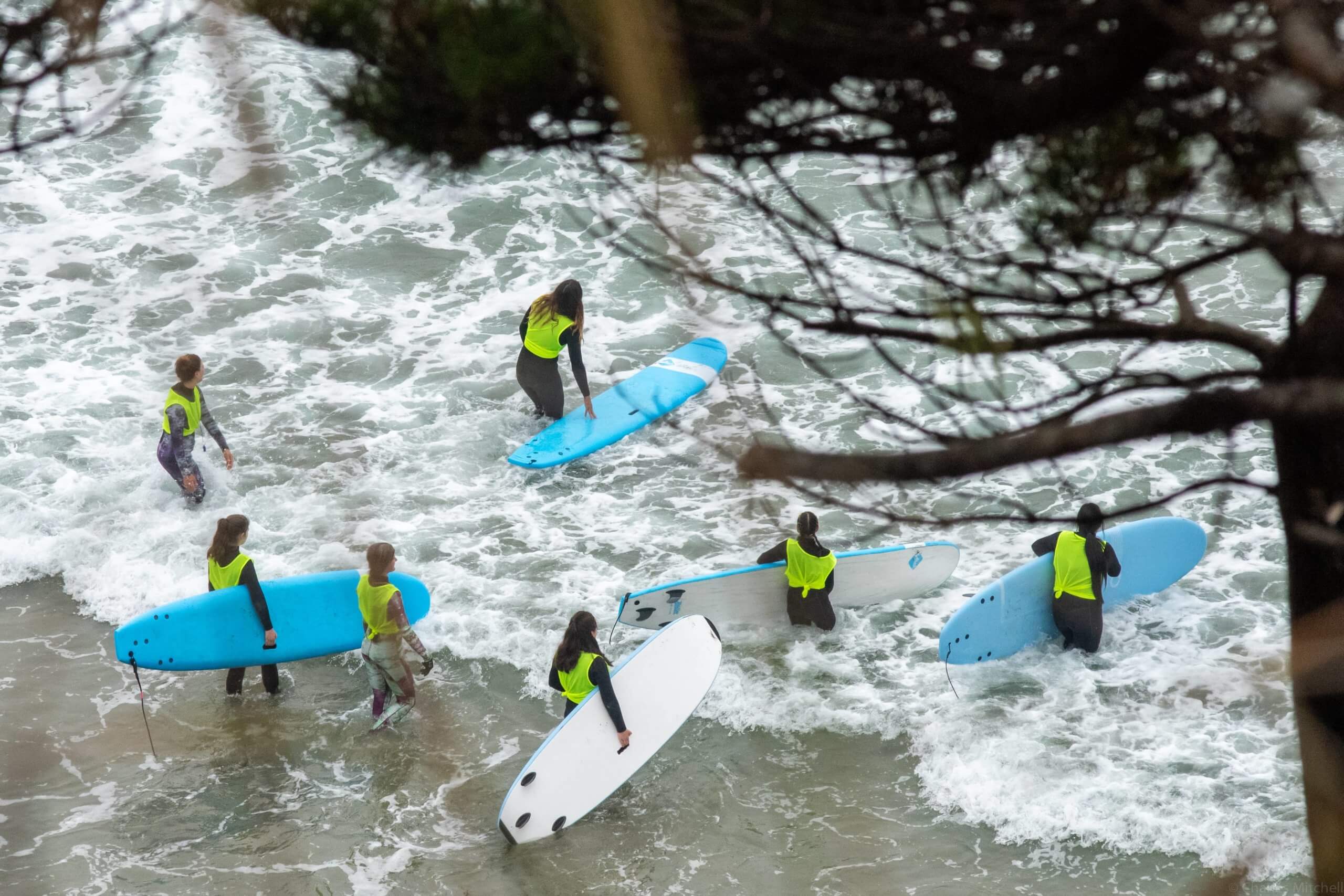
It was through these connections and friendships that Potts was first introduced to the idea of volunteering. “I had some really good friends that were living in my dad’s ohana, it’s a small cottage that’s next to the main house. They’re older and I would always go over and commiserate with them. Be like, man, this is rough. Woe is me,” said Potts. “My friend, I’ll never forget, asked me if I had ever volunteered before and I was like, I don’t understand how that has anything to do with my problems. She was like, well, I recommend it. It’s nice to be in the service of others, take your mind off stuff. And man, did she nail it.”
Potts started researching different volunteer projects around the island, and ended up joining the Honokowai Stabilization Project. She was immediately hooked. “An important thing [I took away from] working with this project was getting to know more local folks and having Hawai’ian kumu or teachers,” explained Potts. “They were able to recognize my struggles with me and teach me ways to be present in the valley, to recognize signs when they’re in front of me, to sit with them. I was able to find a lot of peace within my struggle with my relationship with my father and was able to learn the importance of taking care of ʻʻāina, land in Hawai’ian. There’s a saying in Hawai’i that says malama ʻʻāina, malama pono, which means when all is right with the land, when you respect the land, then all is right in life, then everything is in balance, right? That is the teaching that I brought with me since my young adult life into where I’m at today and why I do what I do. Because I learned that through being in service and being in community, we have family, and it may not be blood family, but it’s family, our true families.”
Volunteering was the compass that guided Potts through her life. Even when she was homeless, living out of the back of her truck, she searched for opportunities to help across the island. “Once I started volunteering, I was like, how can I keep doing this? I just started diving into volunteer projects all over the place, even while I was struggling” said Potts. “That was how passionate I was about it.”
As Potts picked up sponsors for her surfing and found more stability in her life, she had more space to think. In particular, she wanted to use the skills she’d acquired from her years of surfing to give back to the community. “I’ve been teaching surfing since right out of high school,” she explained. “I had met so many women that wanted to be taught by me. A lot of them had very traumatic surfing experiences and most of them involved a boyfriend that was trying to teach them how to surf and putting them in dangerous situations.”
Recognizing the need in her community, Potts decided to host a free surf clinic over the weekend that eventually evolved into the Maui Women’s Surfing Retreats. “At the first meet up there were only a few gals that showed up. I think it was about eight women total. We drank champagne in the morning, it was kind of the tradition so we would have liquid courage before we went out. It settled some of the ladies’ nerves a little bit,” recalled Potts.
That courage was needed. For many of the participants, stepping into the water was a hurdle in and of itself. “Some of them, the instant they stepped foot in the water, they started hyperventilating and grabbing a hold of me. Some would just be in tears. I could tell there was a lot these women were working through,” said Potts. But gradually the participants gained confidence in the water, and the clinic continued to grow over the years. For Potts, the best part of running the clinics is being a connector of the local surf community. She explained, “Introducing women who didn’t know each other before and them being able to help support each other and cheer each other on has been really sweet to witness.”
After six years of running the clinics, Potts’ sponsor at the time asked if she would run a similar style clinic as an event for the company. She agreed, but with the condition that the event would give back to the communities in which it was hosted. So, in order to find the right spot, Potts drove up along the entire West Coast from San Diego. “I got a wild hair in my ass, but my friend called it the Great Spirit,” she laughed. “I was surfing in all the different areas on the West Coast on my journey. In California I was like, oh, my gosh, it’s all white people. I was just so blown away because I’m from Hawai’i, where we’re surfing around people of color everywhere, it makes up a majority of our lineups on most days. My head was spinning. Then as I got into the Northwest, I started to recognize the indigenous communities out there and [wondering], why am I not seeing them out here surfing when they live right here?”
With her sponsor unwilling to fund her research and travel, Potts bounced from spot to spot, sneaking into campsites at night. There were times when doubt crept in as she explained, “I was thinking like, man, am I supposed to be doing this? Then I would find a feather. Feathers were my symbol back then. They told me, just keep going, just keep going.”
Finally, when Potts pulled into Hobuck Beach in Neah Bay, Washington, she knew her search was complete. “I fell to my knees and was like, this is it,” she smiled. “These are the people who I want to offer my retreats. This is their homeland. They’ve got a great spot for learning how to surf. I ended up getting connected with the community and being able to offer a really amazing beach festival as my first introduction into their community.”
She continued, “There were around 15 volunteers and all the local surf community from there in the surrounding areas of Seattle and Port Angeles. So, there was this huge effort and I got to meet a lot of the local surfers and get connected with them. From that first event, I was able to get some photos and be able to put a proposal together for the next community.”
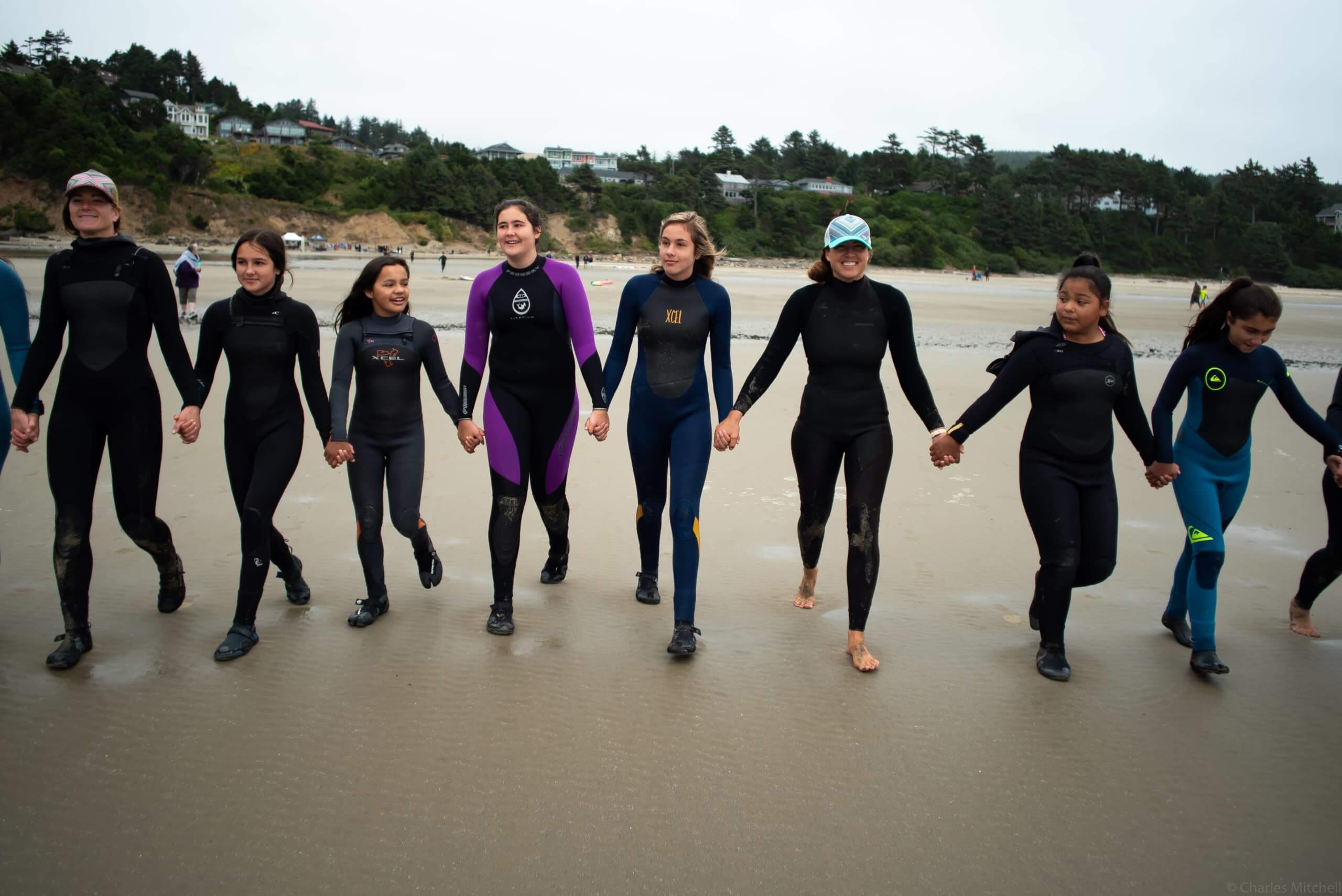
That proposal is now better known as the All Are We Water Collective. The name was inspired by a young boy from the small island of Bequia in the Grenadines. His reading of a poem for the youth performance group, New Roots, left a great impact on Potts. As she explained, “The meaning that I interpreted from that poem was that we are a community. We’re a village. We all look out for and take care of each other. There is no you without me. There is no we without us. So when we eat the food, when I eat the food, we all eat the food. We are sharing everything. There’s so much wisdom in this little twelve year old boy’s poem that I was just taken aback like, well, that’s it right there. He nailed it.”
Over the years, Potts connected with several tribes along the coast including her initial event with the Makah Tribe in Neah Bay, the Tolowa Dee-ni’ Nation in Del Norte, California, and the Confederated Tribes of Siletz Indians at Otter Rock in Oregon.
Developing these relationships has been an ongoing learning process for Potts, as she works with some governments that gained US federal recognition just over 30 years ago. “Take for instance Tolowa Dee-ni’,” said Potts. “Their education department is what is contracting our nonprofit to host the program for them. There’s a lot of new considerations because this is the first time it’s ever happened for them. Each sovereign nation is different in how they operate. They have different protocols regarding public relations. It has been a super educational experience for me and really special to get to be a part of witnessing their growth as a sovereign nation. I get to be a guinea pig for them to be like, okay, what are the protocols? Put it on me and let’s learn together so that they can fine tune and make a really badass government for themselves.”
Potts will be the first to admit that as that guinea pig she’s made mistakes. As an outsider, Potts found that, even when she had the best intentions at heart, she overstepped boundaries. “I’ve been grateful for the opportunity to learn how to be a better ally, to not assume things, to find transparency, and to listen to the needs of the community. Most importantly not pushing my views and ideas onto the communities I partner with.”
“I think the most important piece of advice that I could offer folks that want to be involved in helping Native communities is to start a relationship as a person, introduce yourself, get to know people, and get into the community. Be open to listening and not necessarily pushing your ideas onto the community, which sounds quite opposite of what I did. I was like, here’s my idea and we’re running with it. That’s definitely something that I have learned too, along my ways,” she laughed. “But being more receptive to their community needs, recognizing their community needs and really just listening, just listen to what they have to say. I don’t think they necessarily want to educate us. They’re busy running their government and helping their people. I think it’s really up to us to use the resources that we have to educate ourselves. Then if the opportunity presents itself, be able to learn from someone and ask questions from someone who’s open to helping us learn.”
She continued, “You’re on these folks’ land. What are we going to do about it? Are we doing anything to help these communities, to bring awareness about these communities to the rest of the world? Taking it a step past land acknowledgments? That’s something that my indigenous friends and my friends who work with indigenous communities have taught me, is to ask who is actually benefiting when we’re giving land acknowledgments? And yeah, I think that’s the main consideration. Is [to ask: is] it benefiting the tribe and how.”
For Potts, that benefit is seen every time she’s out in the water with the participants. From the confident smiles of a young girl standing on her first wave, to the emotional healing of a woman’s first laughter since a miscarriage, the ocean has accepted them all. Absorbing all those emotions, just as it did for Potts in her times of need.
“We’ve had one gal who lost her mom right before the clinic we hosted for the Siletz,” recalled Potts. “We did a ceremony where we dropped petals in the ocean and then watched her go out and charge. She surfed beautifully. I’ve also watched her growth as a human over the years and she’s turning into a young woman now. She’s definitely one of the all star surf studs in the community right now. She progresses, she’s listening, she’s paying attention. I can tell she’s in her body. She’s present with herself. It’s really empowering to witness her out there charging.”
After months of being neck deep in creating volunteer training manuals, automated systems, emergency action plans, and video tutorials, Potts is ready to see the fruits of her labor put into work during this year’s clinics. Following the feedback from last year, she’ll be hosting more intimate lessons over the course of several days to the tribes of the Pacific Northwest.
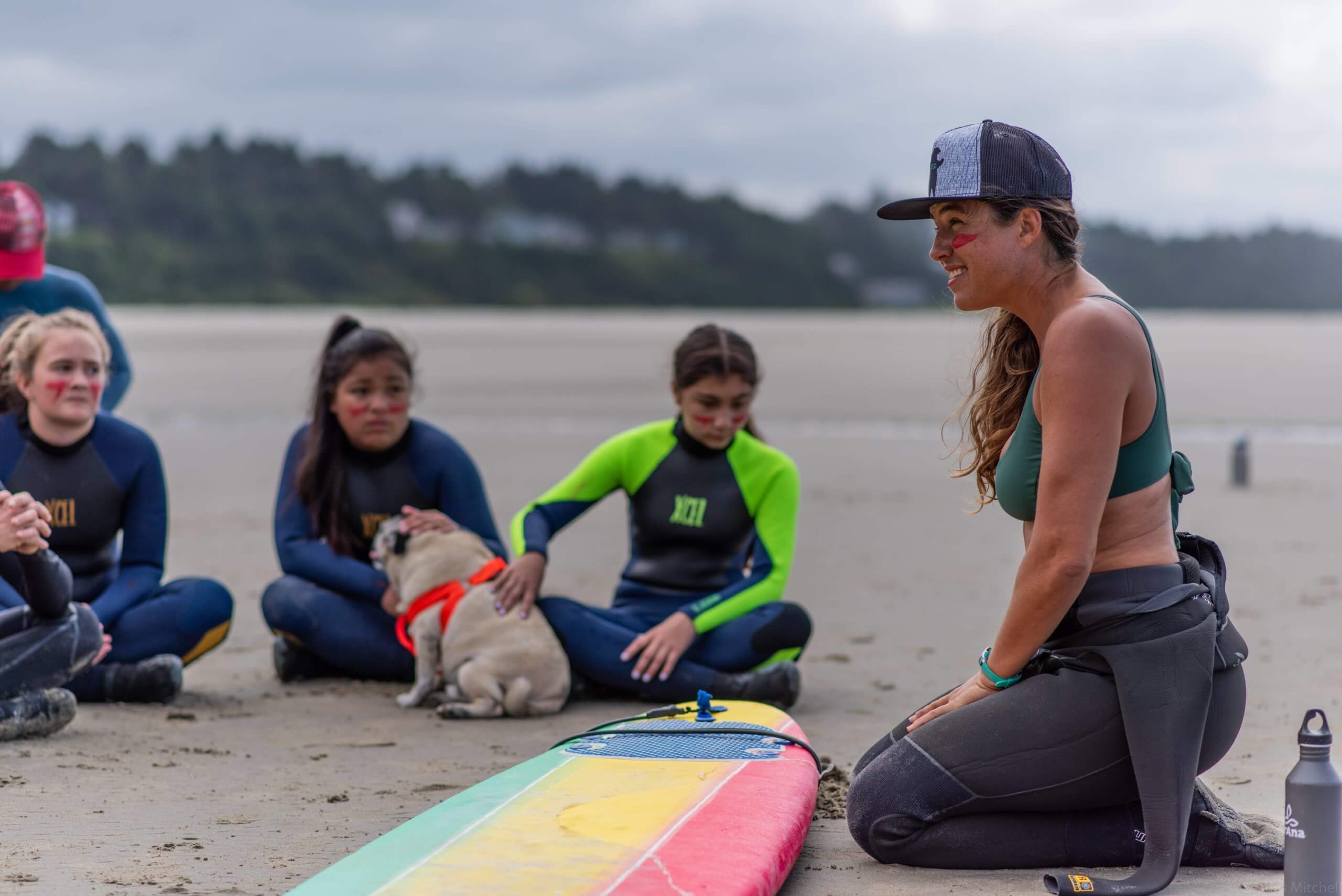
Looking to the future, she hopes to collaborate with the North Coast Junior Lifeguards program as she explained, “That’s how I got connected with my local community at the very beginning besides just kind of surfing around across from my dad’s house. The crazy thing is that one of my best friends, who I made friends with at Junior Lifeguards, we learned how to rescue with a surfboard together. Then that week she got knocked out by my board because we went leashless. I lost my board, she went after it, got ahead of it, the wave caught my board and whacked her on the back of her head. She got knocked out for just a second and I was able to go and use the skills that we had just learned at Junior Lifeguards to save her. That was super powerful. It’s a really important part of our responsibility as surfers [to know how to rescue one another].”
As she reflected back on her years of connecting with and serving communities both in Hawai’i and on the mainland, Potts said, “Even if you don’t know aloha, aloha exists everywhere. Doesn’t matter where you are on the planet, it is everywhere. To me, aloha means being compassionate, being humble, looking for a need, and helping where there is a need. Making sure that we take care of each other and the planet. It has so many meanings, but if we can move forward with aloha in everything that we do, that’s the way to a supportive community and better planet.”
In the spirit of aloha, Maui is still recovering from the tragic fires that burnt down Lāhainā this last August. A lot of folks, history and homes were lost, so if you have the means to help small business owners and families get back on their feet it would be greatly appreciated.
